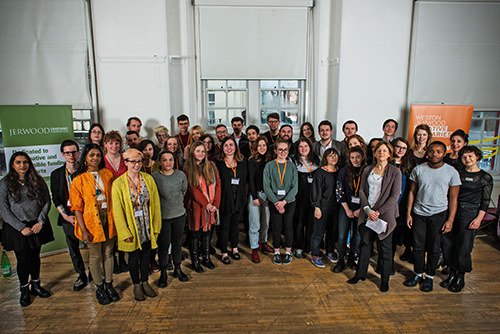Jerwood Arts
Addressing socio-economic inequities in the arts
The Weston Jerwood Creative Bursaries (WJCB) is a national programme dedicated to addressing what the charity calls “the class crisis” in artistic professions. The proportion of people from working-class backgrounds in the arts is half of that seen in the workforce overall.

Image: Outroslide Photography
WJCB finds and supports the arts leaders of the future who could reverse this trend, helping people from different backgrounds get a foothold in the arts and culture sector. Launched in 2010, it partners with cultural bodies to provide one-year, paid fellowships.
The programme started with government backing and is now funded through a consortium of charitable funds. Each year, around 40 fellows are chosen to work with host culture bodies who have partnered on the scheme. More than 100 organisations have taken part.
Crucially, these fellowships are paid, levelling out the long-standing advantage for those at the start of their careers who can afford to support themselves through unpaid internship and voluntary roles. According to the most recent evaluation, 90% of fellows were either in work or had started as freelancers by the time their fellowship ended.
Some WJCB fellows and alumni have reached senior positions in the arts sector, including as curator at the Whitworth Gallery in Manchester, producers with English Touring Theatre and classical music programme manager for the British Council.
Charity Awards judge Chris Michaels said the scheme’s impact is probably best evaluated through the quality of roles that alumni have secured. “Ten years in, you can see this portfolio of really interesting, burgeoning careers happening, and I think that in another ten years we’ll see the CEOs and artistic directors of the future, who came through this scheme.”
Awards judge Cathy Phelan-Watkins agreed that the impacts would take time to filter through, but the scheme was a great step towards real power-sharing. “It’s absolutely necessary. The arts sector is still very white and very posh and it won’t be until we get a greater range of people curating the arts, managing arts centres, actually programming the arts, that we’ll get any real change. It’s probably the only way we’re going to have an arts sector that actually reflects this country.”
CC Reg no. 1074036

